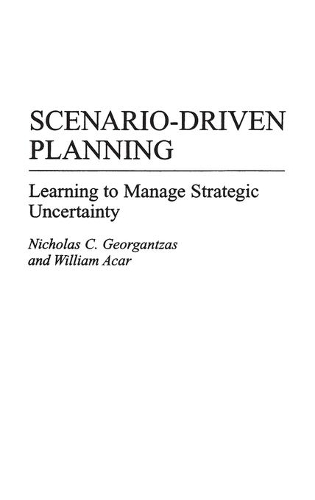
Scenario-Driven Planning: Learning to Manage Strategic Uncertainty
(Hardback)
Publishing Details
Scenario-Driven Planning: Learning to Manage Strategic Uncertainty
By (Author) William Acar
By (author) Nicholas C. Georgantzas
Bloomsbury Publishing PLC
Praeger Publishers Inc
28th February 1995
United States
Classifications
Tertiary Education
Non Fiction
Business strategy
658.4012
Physical Properties
Hardback
432
Description
Scenario-driven planning is a new management technology for strategy design that employs computed or strategic scenarios to improve the quality of managerial thinking. Strategic scenariosthe outcomes of modeling strategic situationsproduce insight much richer than that expected from environmental scenarios alone. They bring to the consulting and upper-level management audiences a better way of handling strategic uncertainty, providing the tools managers and strategy students need for thinking and dialoguing about complex strategic issues. This new Quorum book deals with a subject that has gradually emerged to the forefront of planning theory. Scenario-driven planning (SDP) is a new technology for management design that empowers organizations to address the various uncertainties that beset them. In recognition of the increasing turbulence of the business environment, this new technology for strategic management is attracting a great deal of attention. However, most present approaches to SDP fall short of the full power of modern management practices. Buttressed by an extensive index and reference list, this book is the most comprehensive treatment to date of the scenario approach. Written for practicing managers and consultants distrustful of quick fixes, as well as for academics and students in the field, the book starts with the present business malaise of developed economies and follows it with a presentation of the historical antecedents of the origins of SDP. It then gradually develops a modern treatment of the scenario approach, starting with its origins, proceeding with graduated case studies (simple applications first, followed by standard applications), and finally concluding with discussion of the theoretical issues and emerging trends that underlie the scenario approach. Drawing on their combined theoretical and consulting experiences, the authors enumerate the cognitive biases and other obstacles to the management of strategic uncertainty. They present a method that goes beyond the enumeration of judgemental environmental scenarios, and introduce simple as well as more sophisicated methods for computing strategic decision scenarios. Called CSM (Comprehensive Situation Mapping), this analytical approach to strategic planning allows managerial thinking to soar past the bureaucratic side of planning in order to take advantage of creative dialectics. Because of its computational and dialectic features, the CSM approach can be used by astute corporate leaders as an opportunity for promoting organizational learning.
Reviews
Georgantzas and Acar introduce the scope, methods, and uses of scenario-driven planning. This book contains an extensive review of the literature, many examples, practical guidelines, and company cases to illustrate how scenarios help organizations cope and manage while dealing with uncertainty. The book is recommended for several audiences: business seniors and MBA students can gain insights into their required strategic management course; management consultants, especially executive trainers, can use the real-life strategic situations to represent strategy implementation; and corporate planners and general managers can carry the frameworks presented in action.-Choice
Scenario-Driven Planning by Georgantzas and Acar provides an important, albeit controversial, contribution to the field of strategic management....Georgantzas and Acar challenge the reader to stretch their thinking, to view the world differently, and to realize and plan for alternative futures....Providing a manner by which limited managers can simplify complex business situations into an understandable model to guide their decision making is what makes SDP a fascinating book.-Journal of Global Business
This book would be a great supplement for strategy and OR courses and would be appropriate for executive trainees, consultants, corporate planners, and general managers....The authors' contribution significant and highly relevant for academics, consultants, and practicing managers dealing with strategic uncertainty and risk management.-Interface Review Q825
"Scenario-Driven Planning by Georgantzas and Acar provides an important, albeit controversial, contribution to the field of strategic management....Georgantzas and Acar challenge the reader to stretch their thinking, to view the world differently, and to realize and plan for alternative futures....Providing a manner by which limited managers can simplify complex business situations into an understandable model to guide their decision making is what makes SDP a fascinating book."-Journal of Global Business
"This book would be a great supplement for strategy and OR courses and would be appropriate for executive trainees, consultants, corporate planners, and general managers....The authors' contribution significant and highly relevant for academics, consultants, and practicing managers dealing with strategic uncertainty and risk management."-Interface Review Q825
"Georgantzas and Acar introduce the scope, methods, and uses of scenario-driven planning. This book contains an extensive review of the literature, many examples, practical guidelines, and company cases to illustrate how scenarios help organizations cope and manage while dealing with uncertainty. The book is recommended for several audiences: business seniors and MBA students can gain insights into their required strategic management course; management consultants, especially executive trainers, can use the real-life strategic situations to represent strategy implementation; and corporate planners and general managers can carry the frameworks presented in action."-Choice
Author Bio
NICHOLAS C. GEORGANTZAS is Associate Professor of Management Systems at Fordham University and a management systems consultant. Widely published on topics on model-based strategy support, decision framing, and behavioral simulation modeling, he has consulted in commercial and retail banking, computer and information systems, education, entertainment and multimedia, and other industries. WILLIAM ACAR is Associate Professor of Management Systems and Administrative Sciences at the Graduate School of Management of Kent University. The author of numerous published articles, internal reports, and conference presentations, Dr. Acar has developed a number of methods for management theory and practice. He has consulted to a number of business firms and nonprofit agencies, and has developed a causal mapping method for the analysis of complex business situations called CSM (Comprehensive Situation Mapping).
